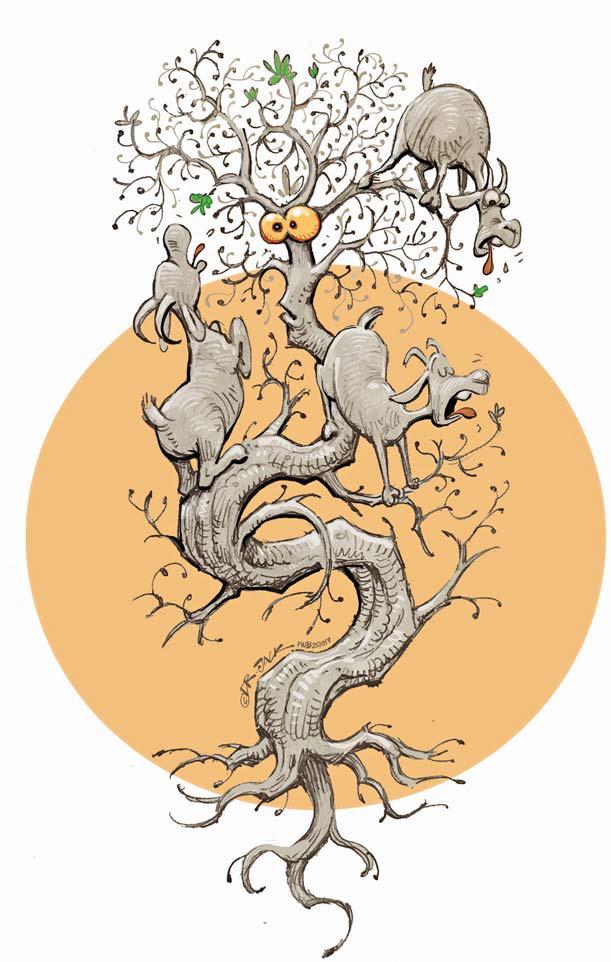Try GOLD - Free
Reviving South Africa's grasslands
Farmer's Weekly
|October 10-17, 2025
Eastern Cape villagers explain the challenges they face when it comes to rangeland degradation to Mhlangabezi Slayi, a research fellow for the Centre for Global Change at the University of Fort Hare.

South Africa's Eastern Cape province has several million hectares of open land in rural areas, not privately owned but held in trust by the state on behalf of communities. The people who live there use it mainly for grazing livestock, subsistence farming and sometimes hunting.
A common misperception is that the grassy, rolling hills will take care of themselves. But these rangelands degrade for many reasons, making them unusable for the small-scale and landless farmers who need communal land for their animals.
Agricultural scholar Mhlangabezi Slayi researches practical ways of preserving rangeland ecosystems so that farmers can continue to graze livestock there. In his latest study, he worked with 150 people from rural Eastern Cape villages to find out how they planned to restore the rangelands closest to them.
WHAT ARE THE EASTERN CAPE RANGELANDS?
The Eastern Cape has extensive communal rangelands made up of grasslands, shrubs and scattered trees. These areas form the backbone of rural life. They provide grazing for cattle, sheep and goats, which some families rely on for milk, meat and income. People also gather fuelwood, medicinal plants and building materials from these rangelands.
Altogether, communal rangelands in the Eastern Cape cover more than seven million hectares, an area roughly the size of Ireland or Sierra Leone. In many rural villages, over 80% of households depend directly on these lands for their daily survival. They serve not only as grazing fields but also as social and cultural spaces integral to people's identities and traditions.
WHAT'S GONE WRONG?
The rangelands in the Eastern Cape are not as self-sustaining as many assume. They suffer from degradation caused by a combination of natural and human pressures.
This story is from the October 10-17, 2025 edition of Farmer's Weekly.
Subscribe to Magzter GOLD to access thousands of curated premium stories, and 10,000+ magazines and newspapers.
Already a subscriber? Sign In
MORE STORIES FROM Farmer's Weekly
Farmer's Weekly
Infrastructure, policy, and finance will be the African continent's growth drivers
Africa's agricultural potential is vast, but inefficiencies in infrastructure, trade policy, and finance limit growth. Investments in transport, cold storage, irrigation, and digital trade systems, among others, are key to unlocking faster, cheaper, and more efficient agricultural trade.
3 mins
January 2-9, 2026

Farmer's Weekly
SAPPO Academy showcases skills development and small business success
The South African Pork Producers' Organisation (SAPPO) Academy, a training organisation that promotes animal, environmental, and public health in the pig industry through knowledge transfer, recently hosted a mini development symposium in Pretoria. The event included an afternoon of meaningful dialogue, strategic learning, and leadership exchange, effectively bridging academic insight with real-world industry innovation.
3 mins
January 2-9, 2026

Farmer's Weekly
Backing for SA Canegrowers as sugar imports soar
Coenie Snyman, winemaker and founder of Rock of Eye Wines, was named the 2025 Diners Club Winemaker of the Year for his Rock of Eye Cabernet Sauvignon 2022, while Marnich Aucamp, assistant winemaker at Stellenbosch Vineyards, won the Young Winemaker of the Year award for his Stellenbosch Vineyards Credo Chenin Blanc 2024 at a gala dinner near Kleinmond in the Western Cape.
1 mins
January 2-9, 2026

Farmer's Weekly
New or used? A practical guide to second-hand farm equipment
Second-hand farm machinery can deliver excellent value, if you know what to look for. Western Cape equipment broker Debbie Smit gave Lindi Botha practical advice to help farmers decide when to buy new, when pre-owned is the smarter choice, and how to avoid the costly pitfalls that often catch buyers off-guard.
4 mins
January 2-9, 2026

Farmer's Weekly
The story of the Drakensberger beef cattle breed's evolution in Africa
The Drakensberger cattle breed has been part of the South African landscape for ages. So-called black indigenous cattle existed in South Africa as early as the 15th and 16th centuries and formed the foundation of the current Drakensberger beef cattle breed.
4 mins
January 2-9, 2026

Farmer's Weekly
Man vs machine - which works best in SA's farming sector?
South African farmers have embraced both mechanisation and staffing solutions to improve farm level efficiency. Sabrina Dean investigated the pros and cons of both and filed this report.
9 mins
January 2-9, 2026
Farmer's Weekly
SA's poultry industry must be more inclusive and sustainable
In spite of great progress made over the past 30 years in South Africa's poultry value chain, setbacks such as avian influenza and trade restrictions are calling for official intervention
2 mins
January 2-9, 2026

Farmer's Weekly
An introduction to forward contracts and commodity futures for South African farmers
The agriculture sector is notoriously volatile, but producers can find stability using financial derivative tools. This article clearly defines and differentiates between two key instruments: forward contracts and futures contracts.
3 mins
January 2-9, 2026
Farmer's Weekly
Less tillage, more life: the machines and techniques behind soil recovery
Soil health is the foundation of global food security, environmental quality, and agricultural sustainability. According to expert Dr Hendrik Smith, reversing the cycle of soil degradation requires the continuous application of regenerative conservation agriculture principles, with no-tillage cultivation being nonnegotiable.
4 mins
January 2-9, 2026

Farmer's Weekly
Five Joburg hotels that make business a pleasure
Even with its well-documented problems, Johannesburg remains the centre of business in South Africa. And unlike some cities with their mountains and oceans, you'll get value and quality for a fraction of the price at these hotels. There are also great views in the mix. By .
6 mins
January 2-9, 2026
Listen
Translate
Change font size
